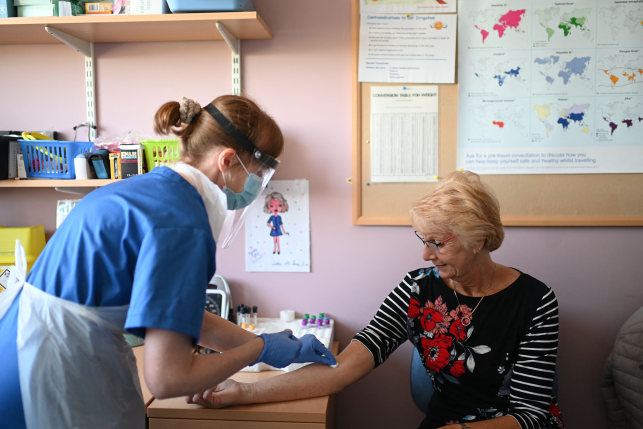Placement: University of California, San Francisco
Mentors: Urmimala Sarkar, M.D., M.P.H., Professor, Division of General Internal Medicine; Associate Chair for Faculty Experience, Department of Medicine; Associate Director, UCSF Center for Vulnerable Populations, San Francisco General Hospital
Julia Adler-Milstein, Ph.D., Professor of Medicine and Director, Center for Clinical Informatics and Improvement Research, UCSF School of Medicine
Project: Organization and Management of Primary Care: Lessons from Integrated Models of Primary Care in U.S. Health Systems
Rebecca (Becks) Fisher, M.A. (Cantab), MB BChir, MRCP (UK), MRCGP, FHEA, is a 2022–23 U.K. Harkness Fellow in Health Care Policy and Practice. She is a general practitioner in a deprived urban area, as well as a senior policy fellow at the Health Foundation, where she leads the organization’s work on general practice. Fisher is particularly interested in how health policy can support equitable provision of primary care services and in models of care and payment for general practice. She has served on multiple national advisory groups, including NHS England’s health inequalities in primary care advisory group, and the National Vaccine Equalities Committee for the COVID vaccine rollout. Fisher is a cofounder of Next Generation GP, a national leadership program for early-career GPs in the U.K. She was previously a National Medical Directors clinical fellow to Sir Bruce Keogh, and an academic clinical fellow at the University of Oxford, where she held a teaching fellowship at Green Templeton College. She completed her medical training at the University of Cambridge, where she graduated with the Roger Morris Prize for medicine and surgery.
Project Overview: The United States and the United Kingdom share challenges regarding the delivery of high-quality primary care. Neither country has enough primary care physicians. Both have scope to improve the organization and management of primary care within their health systems. In the U.K., the “partnership model” of general practice is increasingly precarious. National policy is towards greater integration of primary, secondary, and social care, but what this will look like — in terms of the organization and management of general practice — is unclear. Vertical integration of hospital and primary care services in the NHS is rare, and immature where it does exist — particularly in comparison with large, well-established, vertically integrated health systems in the U.S. Other forms of NHS integration — such as horizontal integration across community providers — exist, but are piecemeal and localized. Tensions between efficiencies generated by scale, and preferences for smaller, independent practice are shared with the U.S. — where Independent Practice Associations have evolved to bridge the gap. This work proposes to learn lessons from vertically and horizontally integrated health systems in the U.S., considering their application to the NHS, and to the wider U.S. health system.

